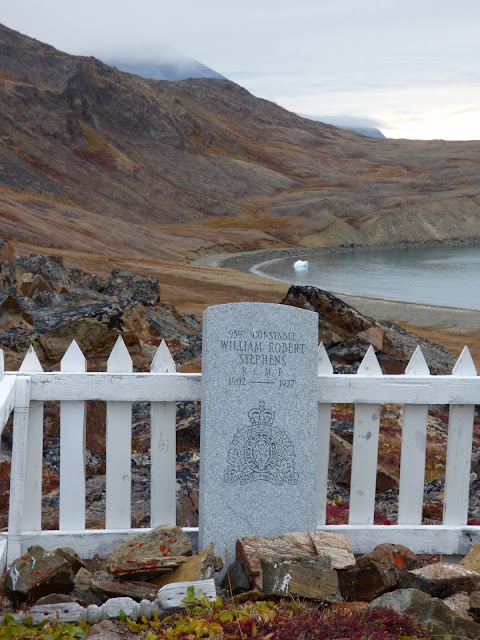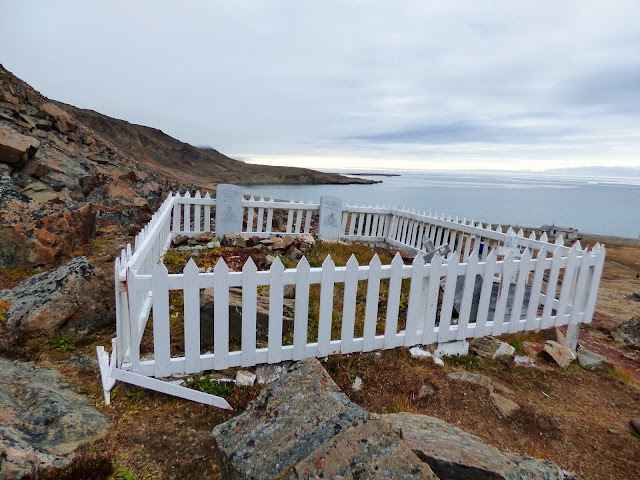Dundas Harbor and Croker Bay, Arctic Canada; 74 degrees north
Adventure Canada tells us:


Day 10 — Saturday August 29, 2015
Dundas Harbour and Croker Bay
In the early 1920s, the Canadian government decided to establish a number of RCMP (Royal Canadian Mounted Police) ports in an effort to support its claim to the Arctic Islands. The Dundas Harbour RCMP post was activated in 1922 and remained open for nearly ten years. In June of 1926 Cst Victor Maisonneuve, one of the original members posted at Dundas Harbour committed suicide while alone at a seal hunting camp at Croker Bay. He was due to be transferred out in August. Tragedy further visited Dundas Harbour Detachment the following August, just prior to the annual return of the supply ship. Cst William Stephens was hunting walrus near the detachment, and accidentally shot himself. The RCMP maintains a cemetery at Dundas Harbour and the Arctic Bay Detachment is responsible for making an annual grave inspection there, to ensure that Cst. Maisonneuve’s and Stephens's graves are kept in good order and their memory maintained. There is also the grave of the baby of one of the special constable's daughter. The detachment still stands, and is in surprising good shape, having been unoccupied since 1951. We'll also stop to examine the remains of a Thule site and we hope to spot some musk oxen.
This afternoon we'll sail down beautiful Croker Bay. John Ross who explored the bay in 1818 named the area after John Croker who was then the First Secretary of the Admiralty—a position he held for more than twenty consecutive years. Ross was re-examining the observations that William Baffin had made two hundred years before. Upon reaching what is now known as Crocker Bay, Ross went no further, for he was misled by a mirage, which appeared to show mountains at the end of the strait. He named the apparent mountains "Crocker Hills". The mountains Ross saw proved to be nonexistent - perhaps an Arctic optical illusion. We hope to get close to one of the glaciers that empty into the bay and you should keep your eyes open for wildlife, Dundas Harbour is located at on Devon Island, overlooking Lancaster Sound. Devon Island is the largest uninhabited island on Earth, comprising some 55,247 square kilometres.
Dundas Harbour and Croker Bay
In the early 1920s, the Canadian government decided to establish a number of RCMP (Royal Canadian Mounted Police) ports in an effort to support its claim to the Arctic Islands. The Dundas Harbour RCMP post was activated in 1922 and remained open for nearly ten years. In June of 1926 Cst Victor Maisonneuve, one of the original members posted at Dundas Harbour committed suicide while alone at a seal hunting camp at Croker Bay. He was due to be transferred out in August. Tragedy further visited Dundas Harbour Detachment the following August, just prior to the annual return of the supply ship. Cst William Stephens was hunting walrus near the detachment, and accidentally shot himself. The RCMP maintains a cemetery at Dundas Harbour and the Arctic Bay Detachment is responsible for making an annual grave inspection there, to ensure that Cst. Maisonneuve’s and Stephens's graves are kept in good order and their memory maintained. There is also the grave of the baby of one of the special constable's daughter. The detachment still stands, and is in surprising good shape, having been unoccupied since 1951. We'll also stop to examine the remains of a Thule site and we hope to spot some musk oxen.
This afternoon we'll sail down beautiful Croker Bay. John Ross who explored the bay in 1818 named the area after John Croker who was then the First Secretary of the Admiralty—a position he held for more than twenty consecutive years. Ross was re-examining the observations that William Baffin had made two hundred years before. Upon reaching what is now known as Crocker Bay, Ross went no further, for he was misled by a mirage, which appeared to show mountains at the end of the strait. He named the apparent mountains "Crocker Hills". The mountains Ross saw proved to be nonexistent - perhaps an Arctic optical illusion. We hope to get close to one of the glaciers that empty into the bay and you should keep your eyes open for wildlife, Dundas Harbour is located at on Devon Island, overlooking Lancaster Sound. Devon Island is the largest uninhabited island on Earth, comprising some 55,247 square kilometres.
Inuktitut word of the day:
Qinalugaq — Whale
Qinalugaq — Whale
"Nobody climbs mountains for scientific
reasons. Science is used to raise money for
the expeditions, but you really climb for the
hell of it.” —Edmund Hillary
A good morning ashore at Dundas Harbor (see my lousy photos of a harp seal, gyrfalcon, red throated loon, belugas, and polar bears - I'm including them because it was exciting to see them, but was not fortunate enough to get great photos. Many great photos of bears to come though. During the afternoon the captain maneuvered the ship very close to the faces of the two Croker Bay glaciers - the closest they had ever gotten according to staff.
A good morning ashore at Dundas Harbor (see my lousy photos of a harp seal, gyrfalcon, red throated loon, belugas, and polar bears - I'm including them because it was exciting to see them, but was not fortunate enough to get great photos. Many great photos of bears to come though. During the afternoon the captain maneuvered the ship very close to the faces of the two Croker Bay glaciers - the closest they had ever gotten according to staff.
Thule era gravesite
Thule era gravesite
Thule era gravesite
Harp Seal
Harp Seals
Red throated loon
Gyrfalcon
Remains of the RCMP site
Belugas (young belugas are gray, they turn white as adults)
Belugas (young belugas are gray, they turn white as adults)










































































Comments
Post a Comment